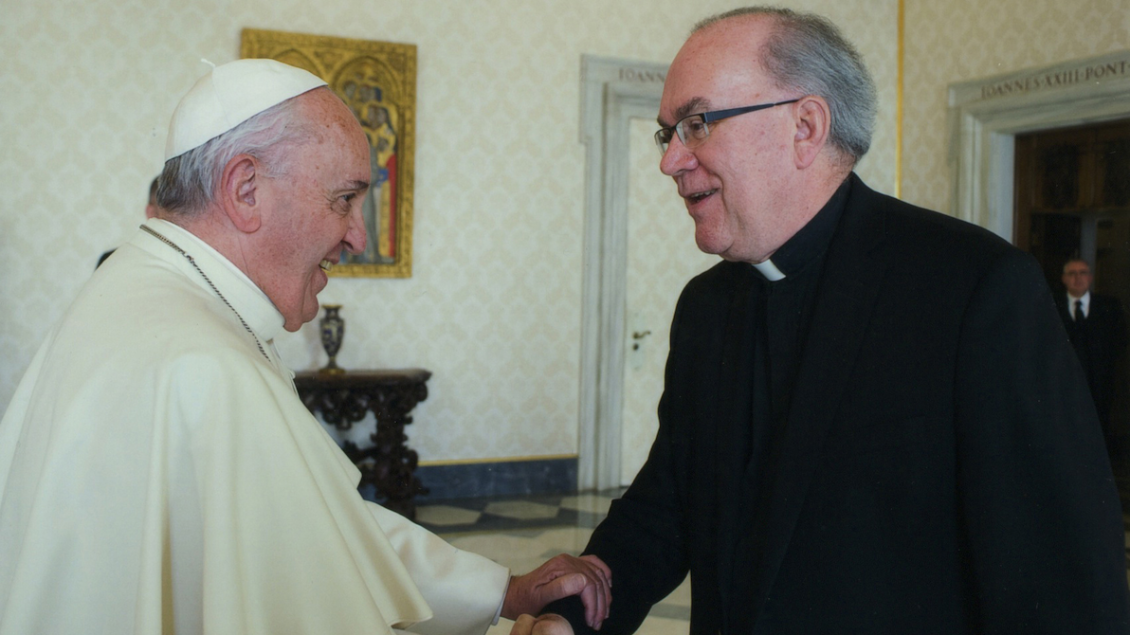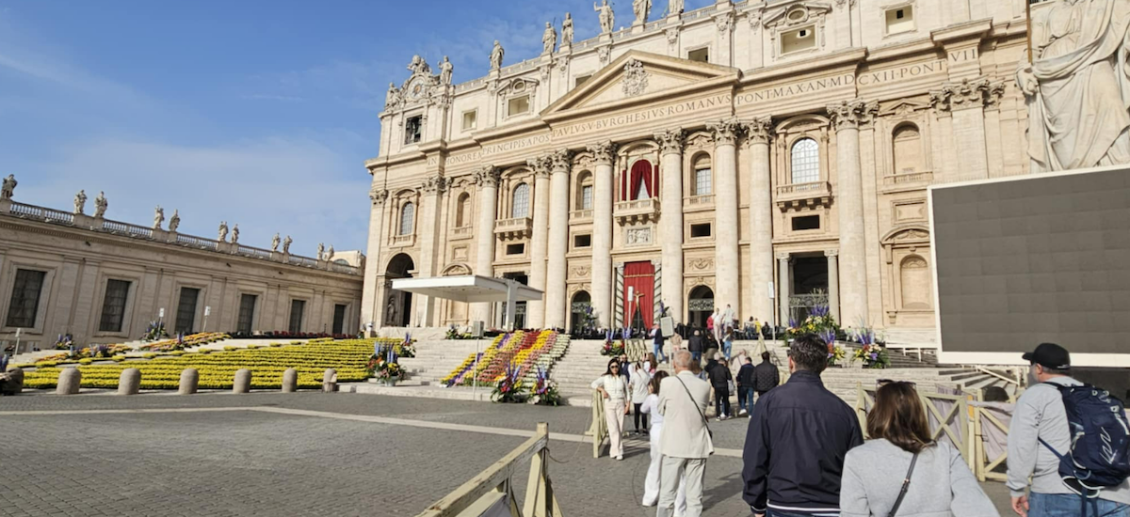/0x35:2400x1566/prod01/channel_34/media/seattle-university/news-amp-stories/images/Pope-Francis-main-photo-with-people.jpg)
Seattle University joins the world in recognizing the Pope’s impact on putting faith into action.
With deep sorrow, Seattle University joins millions of people around the world in mourning the passing of Pope Francis, a spiritual leader whose papacy was marked by profound humility, unwavering advocacy for the marginalized and a bold vision for a Church rooted in mercy, justice, inclusivity and love. Pope Francis passed on the morning of April 21 at age 88.
Born Jorge Mario Bergoglio in Buenos Aires, Argentina, Pope Francis became the first Jesuit pope, the first Latin American pope and the first pope from the Americas. His election in 2013 heralded a new chapter for the Catholic Church, one characterized by a return to the core Gospel values of simplicity, service and care and solidarity with the poor.
For the Jesuit community, the papacy of Francis was deeply meaningful. As a fellow Jesuit, he embodied the spirit of cura personalis, “care for the whole person,” which is at the heart of Jesuit education. His life was a living testament to the ideals St. Ignatius of Loyola envisioned—humility in leadership, depth in discernment and a courageous commitment to social justice.
“Along with Catholics around the world, and all people of good will, I grieve the loss of our Holy Father,” says Seattle University President Eduardo Peñalver. “Pope Francis’s deep humility and pastoral warmth have been blessings to the Church and to the world. Particularly during this past turbulent decade, he has been a perfect match for our times.”
Faith in Action
Throughout his time as pontiff, Pope Francis reminded the world that faith is an active movement. He called on the Church to go out into the streets, to accompany those on the margins and to listen more than speak. This approach resonated with Jesuit institutions of higher education everywhere, inspiring students, faculty and administrators to think deeply about how they serve others.
Seattle University Vice President for Mission Integration Catherline Punsalan-Manlimos says Pope Francis exemplifies what we mean by being progressive, innovative and Jesuit and Catholic. Pope Francis’ papacy helped SU’s Institute for Catholic Thought and Culture lean more fully into what its vision of exploring the intersection of faith and reason and church and the world looked like, she says.
“He gave us language that people can easily understand about what grounds our commitments,” Punsalan-Manlimos says. “This includes migration and care for our common home. Seattle University has been a leading voice and convener of conversations in these two areas. Pope Francis inspired the sustained engagement with these issues over the years.”
In its mission of educating leaders for a just and humane world, Seattle University found a kindred spirit in Pope Francis, including in his emphasis on ecological responsibility.
His encyclical Laudato Si’—a groundbreaking reflection on environmental stewardship—echoed across academic disciplines at Seattle University and the world will recognize its 10th anniversary in May. Central to Laudato Si’ is caring for one another, our communities, the world and the planet—particularly in light of the climate crisis.
In 2021, President Peñalver signed a letter of commitment to join the “Seven-Year Journey Toward Integral Ecology” Laudato Si’ Action Platform (LSAP) and adopted it as a goal in the university’s strategic directions. The LSAP papal initiative envisions sustainability in the spirit of integral ecology and calls to redefine and rebuild our relationship with each other and our common home.
“As the first Jesuit Pope, his emphasis on the importance of caring for our common home and for those on the margins has set the tone for Seattle University and for Jesuit higher education as a whole,” President Penalver says. “His legacy includes his many writings, especially his encyclical Laudato Si, which will continue to inspire our work as we seek to empower our students to become leaders for a more just and humane world.”
A Personal Connection
Seattle University Chancellor Stephen Sundborg, S.J., escorted a Seattle family to meet Pope Francis in Vatican City in 2014, while Father Sundborg was President of Seattle University. He says that Pope Francis’ commitment to compassion for all, especially the poor and migrants, made him the “Pope of Mercy.”
Fr. Sundborg says two things that stood out to him during his meeting with Pope Francis were the compassion he showed to the suffering a member of his party was experiencing and how earnestly he asked them to pray that “God’s protective hands extended over me never be withdrawn.” He says it made him feel like they were in the presence of “a friendly and wise uncle.”

Father Sundborg meeting the Pope in Vatican City in 2014. © Vatican photographer Servizio Fotografico De "L'O.R"
“When I learned of his death, I felt like it was the loss of a friend,” Fr. Sundborg says. “He always remained so close to people, to walking with them and listening to them. Even as pope, he was very personally and candidly present to all. This was deepened for me in that he was also a brother Jesuit.”
Dialogue Over Division
Seattle University found in Pope Francis a leader who spoke to our shared concerns. He did not shy away from difficult conversations—on climate change, gender equity, economic inequality or the plight of refugees. Instead, he encouraged dialogue, discernment and active engagement.
In his final years, Pope Francis continued to prioritize dialogue over division. Whether speaking to global leaders or washing the feet of prisoners, he modeled the radical hospitality that the Gospel demands. His voice carried a moral clarity that compelled the world to listen.
For Jesuit institutions such as Seattle University, Pope Francis reaffirmed the importance of engaging the world as it is—not withdrawing from it. He taught us that education must be both intellectually rigorous and ethically grounded and that knowledge must serve not only the mind, but also the heart and conscience.
Punsalan-Manlimos hopes Pope Francis’ passing will be an invitation for everyone to reflect on his life and teachings and respond to the many things dividing us and preventing us from seeing the full humanity in all human beings. She adds that Pope Francis left a wealth of reflection and action to help guide an understanding of Jesuit education rooted in Ignatian spirituality, while inviting dialogue not only across differences but across disciplines.
Arturo Araujo, S.J., Jesuit Artist-in-Residency at Seattle University, expressed deep gratitude and sorrow on behalf of the Arrupe Jesuit Community at SU. He says three key contributions defined Pope Francis’ legacy: The Catholic Church must be a home of compassion; Laudato Si’ as a prophetic wake-up call and new model for how the Church engages pressing global challenges; and the Church is the People of God, called to walk together.
Father Araujo says Pope Francis’ papacy marked a turning point for many, especially those educating young people and future leaders.
“Pope Francis insisted that we cannot educate the person without also educating their relationship with the world,” Fr. Araujo says. “Laudato Si’ strengthens our mission by insisting that faith and care for the earth, contemplation and action, the inner life and the common good must never be separated.”
In mourning his passing, the Seattle University community remembers that Pope Francis’ legacy is not confined to his years in the Vatican. Rather, it lives on in every act of mercy, every student who seeks academic rigor and stands for justice, every scholar who questions with integrity and every community that chooses compassion over comfort.
We extend our prayers to the Catholic Church worldwide and to all who were touched by Pope Francis’ vision of a more merciful, inclusive and loving world. In the Ignatian spirit of finding God in all things, we see God in the life and legacy of this extraordinary shepherd.
Seattle University will join with the Church Universal in a traditional nine-day mourning period. Over these next nine days at the Chapel of St. Ignatius, the Mass intentions at the weekday 12:30 p.m. and Sunday 11 a.m. and 5 p.m. will be for the repose of the soul of Pope Francis. On the final day, Wednesday, April 30, there will be a special Mass at 12:30 p.m. in thanksgiving for the life and pontificate of Pope Francis. All are welcome.

People gather outside the Vatican on the day of the pope's passing.
/0x104:2400x1620/prod01/channel_34/media/seattle-university/news-amp-stories/images/Audrey-Hudgins-pope-pic.jpg)
/18x0:2377x1490/prod01/channel_34/media/seattle-university/news-amp-stories/images/Immersion-trip-group-shot-USE.jpg)
/0x41:2400x1557/prod01/channel_34/media/seattle-university/news-amp-stories/images/PrezSpeaker_SamSawyerSJ_td_005-copy.jpg)